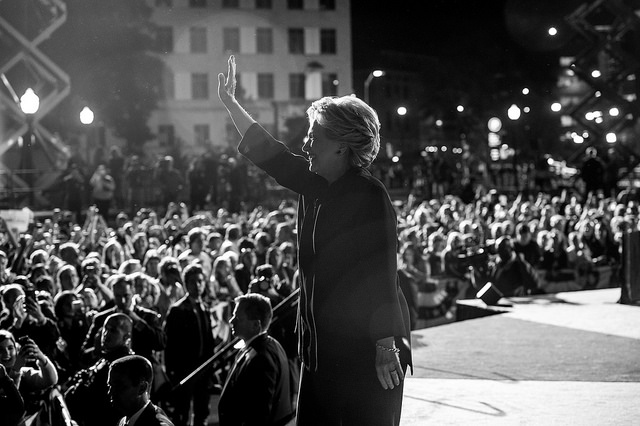Spending my days immersed in the cavalcade of impending constitutional crises and reprehensible bigotry emanating from the Trump administration is a colossal, heartbreaking drag.
It always would have filled me with despair and grief and rage, but there is the additional heartbreak of juxtaposing it against where we could have been. As I expressed to Iain in a particularly low moment last week: "I was supposed to be writing about the Hillary Clinton administration."
I am still not over Hillary Clinton not being president. I never will be.
One of the things that makes that loss—not just the election loss, but the loss of a future which would have looked vastly different—even tougher is the oppressive silence about the role misogyny played in this election.
The misogyny that was directed at Clinton herself, by the media and by her opponents, embedded in the narratives they used against her and centered shamelessly in the chants they led about her.
The misogyny of voters who couldn't say what exactly it was they didn't like about her, but just couldn't bring themselves to vote for her.
The continuing misogyny of Occam's Big Paisley Tie-ing every conceivable explanation, no matter how unlikely, for Obama voters flipping to Trump, without even the merest mention of the possibility that a person who has always voted for men before just wanted to keep on doing it.
There is no meaningful public conversation about the role misogyny played in the election, in which the first ever major-party female candidate lost to a confessed serial sexual abuser, while simultaneously winning by 3 million votes. There is no discussion of how the media covered her email for 600 days, nor how a photo of her reading the headline about Mike Pence's email has been treated more like a punchline than a cause for national grief.
You guys, my friend is on the same plane as Hillary Clinton. Zoom in on the title of the article she's looking at. pic.twitter.com/356oE9uT0s
— J👏🏻O👏🏻H👏🏻N (@thelastwalt) March 3, 2017
There has been not the slightest attempt from the mainstream political press to engage in robust self-reflection about the misogyny in which they engaged, implicitly and overtly, treating her differently in subtle ways and brazenly convening panels to discuss her voice, her tone, her clothes.
In the middle of writing this piece, I read Sady Doyle's terrific essay about misogyny as a unifying political force. I also saw Donald Trump advisor and close friend Roger Stone's misogynist tirade against Caroline O. There has been little public discussion about these things, and what it means that powerful men are not merely vessels of rank misogyny, but are animated and motivated by rank misogyny.
That misogyny is an organizational center for large swaths of the American electorate—on both the right and the left.
Every woman experiences misogyny virtually every day of her life, in big and small ways. In ways that we sometimes understand only instinctually and have difficulty putting into words. From strangers, from men we trust, from other women. Every woman, irrespective of whether she acknowledges it, is subject to misogyny—because that's how institutional oppression works.
And yet. We are supposed to accept that misogyny didn't play a role in this election. Or played a part so minor it isn't even worth comment. We are meant to believe that when all the sexists who direct sexism at women every day went into a voting booth, they left their sexism on the other side of the curtain.
I don't believe that.
That isn't to suggest that misogyny is the only reason a person could have conceivably failed to cast a vote for Hillary Clinton. But just because there exist potential other reasons categorically does not mean we get to ignore that misogyny was a big fucking reason.
Especially when the "other reasons" aren't really separate from gender at all.
I want to talk about the role misogyny played in electing Donald Trump. I need to talk about it, not just because it is an important and necessary conversation to fix what is broken, but also because the insistence that there is no need to talk about it is tacit acceptance. I don't accept it. And I don't accept the cultural gaslighting implicit in ignoring or silencing women (and men) who saw what happened and are now dismissed like cranks or fools or sour-grapes hysterics.
And then there is this: I think the lingering grief I feel would be easier if we at least talked about it.
Many people have observed Clinton's loss felt like a death. It feels like that to me, in the way that death also breaks the promise of a future. So not talking about it feels as though my friend died, but I'm not allowed to talk about what killed them.
I want to talk about what killed this future I wanted so much. All of the things that derailed it, but especially this one.
Denying it is replicating it. And I suspect, for many of the people who engaged in or chose to ignore misogyny in the first place, that is precisely the point.
Which is perhaps the most compelling argument for this conversation.





Shakesville is run as a safe space. First-time commenters: Please read Shakesville's Commenting Policy and Feminism 101 Section before commenting. We also do lots of in-thread moderation, so we ask that everyone read the entirety of any thread before commenting, to ensure compliance with any in-thread moderation. Thank you.
blog comments powered by Disqus